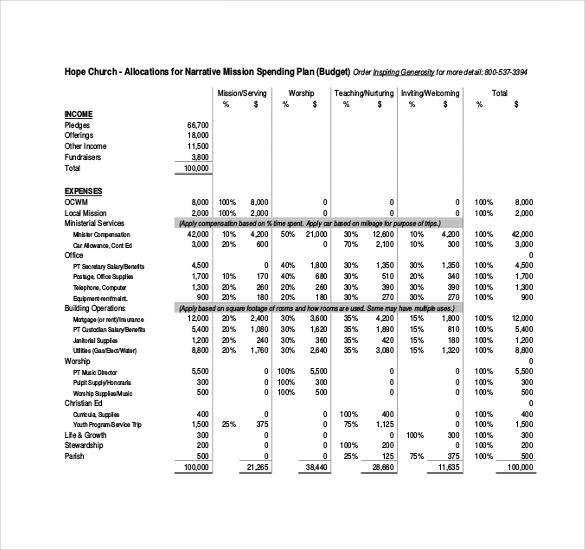If you're involved with your local church, you're likely aware that finances play a significant role in ensuring that your congregation can continue to thrive and serve its community. That's why creating and sticking to a church budget is so important - it helps ensure that your church can fund all of its necessary expenses while still being a good steward of the resources you've been given. In this post, we'll take a closer look at some tips, ideas, and how-to's for creating an effective church budget.
Sample Church Budget Templates
Before we get into the nitty-gritty of creating your own church budget, it may be helpful to look at some sample church budget templates to give you an idea of what you should be aiming for. Here are a few options:
 This template offers a clear and concise breakdown of various categories of church expenses, and even offers suggestions for how much of your budget should be allocated to each category.
This template offers a clear and concise breakdown of various categories of church expenses, and even offers suggestions for how much of your budget should be allocated to each category. If your church has specific ministries that it funds, this template may be a good option for you. It allows you to break down your budget by individual ministry and see how much you're spending on each.
If your church has specific ministries that it funds, this template may be a good option for you. It allows you to break down your budget by individual ministry and see how much you're spending on each.While not a church-specific template, this budget example offers a helpful reminder of the importance of keeping expenses in check and being mindful of what you're spending.
Tips for Creating Your Church Budget
So, now that you've seen some examples of what your budget could look like, how can you go about creating your own? Here are some tips to consider:
1. Involve your church leadership team in the process.
When creating a church budget, you don't want to go it alone. Make sure you're involving your church's leadership team in the process - after all, they have a better idea of what expenses and income streams the church has to work with. Getting their input and buy-in can also make it easier to actually stick to the budget once it's been created.
2. Use historical data to inform your budget projections.
While it's impossible to predict the future with 100% accuracy, using data from past church budgets can be a helpful way to inform your projections for the coming year. Look at how much money you've typically brought in from tithes and offerings, as well as how much you've spent on various church expenses in the past. This can give you a good idea of what to expect in the future.
3. Take into account any special events or initiatives.
If your church is planning any special events or ministry initiatives in the coming year, make sure you're accounting for those in your budget. You'll want to make sure you have enough funds to cover these extra expenses without having to dip into other areas of the budget.
Ideas for Cutting Church Expenses
If you're finding that your church budget is tighter than you'd like, here are a few ideas for ways to cut expenses:
1. Reduce paper usage by going digital.
Paper costs can add up quickly, especially if your church distributes a lot of printed materials like bulletins and newsletters. Consider going digital instead. You can use email newsletters and bulletins instead of printed ones, and even switch to digital giving platforms like PayPal or Venmo.
2. Encourage carpooling for events.
If your church frequently organizes events that require driving, encourage members to carpool to save on gas and transportation costs.
3. Evaluate your utility bills.
Take a close look at your church's utility bills (like electricity and water) and see if there are any cost-saving measures you can take. For example, you could switch to energy-efficient lightbulbs or install low-flow faucets to save on water usage.
How to Stick to Your Church Budget
So, you've created your church budget - now what? The key is to make sure you're actually sticking to it. Here are some tips for doing just that:
1. Track your spending regularly.
Make sure you're monitoring your church's actual spending regularly and comparing it to your budget projections. This will help you catch any discrepancies early on and make adjustments as needed.
2. Involve the congregation in the budget process.
Transparency is key when it comes to church finances. Make sure your congregation knows what the budget is and how it's being used. Consider holding a meeting or distributing a report that outlines the budget and explains how the money is being allocated.
3. Be open to adjusting the budget as needed.
A church budget is a living document - it's not set in stone. If you find that you need to make adjustments (either because of unexpected expenses or because you're bringing in more money than you anticipated), don't be afraid to do so. Just make sure you're communicating those changes to your church's leadership team and congregation so everyone is on the same page.
Creating and sticking to a church budget may seem daunting, but it's an important part of ensuring that your church is financially healthy and able to continue its mission. With some careful planning and a willingness to adjust as needed, you can create a budget that works for your church's needs.